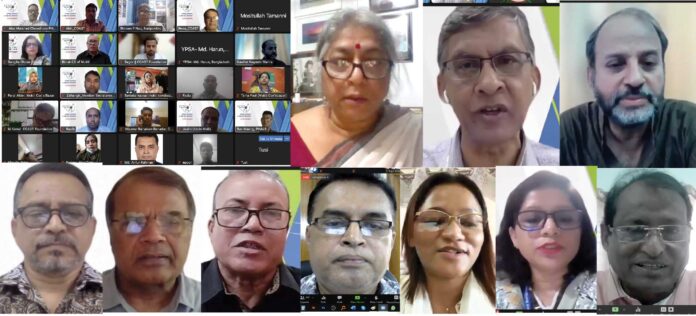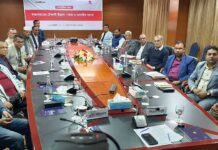Dhaka, 24 August 2022. Civil society leaders have expressed the opinion that the international community, including the United Nations, has completely failed to exert effective pressure on Myanmar to take back the Rohingyas to their homeland. They said these s at a discussion meeting organized by Cox’s Bazar CSO-NGO Forum (CCNF) today. Although Bangladesh bears no responsibility for the Rohingya problem, which is completely Myanmar’s fault and is a global crisis, Bangladesh has to bear the severe responsibility of this. The responsibility for this must fall on the global communities.
The meeting organized by CCNF, a network of around 50 local and national organizations working in Cox’s Bazar, was moderated by Rezaul Karim Chowdhury, Co-chair of the forum and Executive Director of COAST Foundation, and Abu Morshed Chowdhury, another Co-chair and Chief Executive of PHALS. Shireen Huq of Naripokkho, Barrister Mazoor Hasan of BRAC University’s Center for Peace and Justice , Disaster Forum’s Gowher Nayeem Wahra, YPSA’s Md. Arifur Rahman, Sheuli Sharma of Jago Nari Unnayan Sangtsha , Md. Mujibul Rahman of Sushilan, Sangeeta Ghosh of ACLAB and Co-Chair of CCNF and Chief Executive of Mukti Cox’s Bazar Bimal Chandra Dey Sarkar and Member Secretary of the Network Md Jahangir Alam also spoke at the occasion.
Abu Murshed Chowdhury said, there are about 1.2 million Rohingya people living in the nation. Except for a few UN resolutions, there has been no successful effort to return them to Myanmar thus far, which has left the Rohingya population unsure and frustrated as well as the locals. To secure repatriation, formal and informal diplomacy, often known as track two diplomacy, should be prioritized. Building female leadership among the Rohingya refugees was a priority for Sheuli Sharma. Bimal Chandra Dey Sarkar said, Nearly half of the Rohingya population, are children and young adults. This sizable population must participate in a variety of camp activities and receive technical and life skills training. This will lessen their likelihood of going astray, and even if they return to Myanmar, they will be able to establish respectable jobs. Md. Mujibur Rahman said, the construction of the camp caused harm to around 6,000 acres of mountainous terrain and 2,000 acres of forest. A little over 2500 families working in social forestry did not get compensation. The water level is going down. Use of plastic in camps should be banned since it is such a significant problem. An Environmental Pool Fund should be created for environmental restoration. Sangeeta Ghosh said reproductive health services should be ensured for teenagers. Md. Jahangir Alam said, the local government institutions should be involved in the planning and execution of the Rohingya program and the local organizations should take lead in carrying out operations on the ground to cut costs. At present, the participation of local organizations in the Rohingya program is insufficient. Md. Arifur Rahman said, intelligence gathering should be intensified in the camps to prevent the formation of any new religious extremist organizations. If such groups emerge within the camp, the country will be in jeopardy. General Secretary of Ukhiya Reporters Unity, Rafiq Uddin, said that although the Rohingya camp recently got help in repairing the Rohingya houses damaged by fire, the local 14 families there did not get any help. Special attention should also be given to all affected local families.
Gowher Nayeem Wahra said that repatriation should be kept at the center of the Rohingya program. A national strategy for resettlement should be developed and the implementation progress of the plan should be regularly reviewed. Also, the communication between the civil societies of the respective countries including Bangladesh and Myanmar should be increased. Barrister Manzoor Hasan said that the international community, especially the United Nations, has failed in repatriation. ASEAN also failed in this regard. The Rohingya crisis has become a protracted crisis, requiring regional and international initiatives. There is no alternative to implementing a localization roadmap to deal with the crisis as funding is dwindling. Shireen Huq said that until the repatriation, special programs should be implemented for the women of the Rohingya camps. Tree plantation program should be implemented in camps. Rezaul Karim Chowdhury said that the comprehensive development program of the government is being implemented for Cox’s Bazar. Up to 70 projects totaling roughly $3.3 billion are now being carried out. The development efforts in Cox’s Bazar must be kept safe from all dangers in order to preserve the nation’s wealth. If sustainable repatriation is not assured, the Rohingya crisis could pose a serious threat to Cox’s Bazar and the entire nation.
Related Document [Bangla Press] [English Press] [Position Paper Bangla] [Position Paper English]
Newspaper:




















